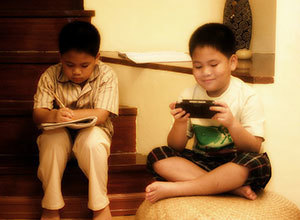 © Cherrie Borres-Zem
© Cherrie Borres-Zem
A new article by University of Notre Dame anthropologist Michael Jindra offers a fresh and provocative statement of how culture contributes to inequality and argues that there is an unrecognized dilemma involving two major, contentious features of contemporary life: diversity and equality.
Jindra argues that the tension between the values of economic equality and diversity can be found through the world, and yet it rarely is recognized by scholars, partly because it deals with the sensitive area of culture and poverty.
“After the controversy over the ‘culture of poverty’ thesis of the 1960s, culture has been avoided in explanations of poverty and inequality,” Jindra said.
Jindra examines groups from Europe to the Australian aborigines to various lifestyle cultures in the U.S., such as “occupational devotees” and those pursuing “leisure careers.” He shows how these groups, whether subcultural or ethnic, have created more diversity, but also stronger extremes of both wealth and poverty.
“The tension expressed itself in predicaments in contexts ranging from government policy — for example, on indigenous groups — to the workings of local antipoverty nonprofits, often confounding attempts to deal with the issue of inequality,” Jindra said.
Since political leaders are unaware of the clash between the two values, it leads to pendulum-like swings between allowing diversity or autonomy and battling inequality. At the ground level, antipoverty nonprofits live in the diversity-equality paradox in their crucial work with the poor, where the battle against poverty is most visible.
The article straddles and complements some of the more provocative current writing on inequality. On one side is Piketty’s argument, which is based on aggregate economic mechanisms. On the other side stands Amy Chua’s “Tiger Mother” thesis and her co-authored “Triple Package” argument, which highlights the psychological mechanisms that purportedly spur achievement in specific ethnic groups. Jindra’s article, meanwhile, points at broader (sub)cultural processes to draw its conclusions.
Jindra criticizes scholars for ignoring the dilemma of equality and diversity, and highlights the few who recognize it. “Anthropologists ought to offer their unique insight into the tremendous diversity that is ignored by most who study inequality,” he said. “This will be a tricky enterprise, but well worth it if it gives us better insight into what contributes to poverty and inequality, while remaining sensitive to diversity.”
Jindra’s article appears in the journal Current Anthropology, and is available at journals.uchicago.edu/CA.
Contact: Michael Jindra, mjindra@nd.edu